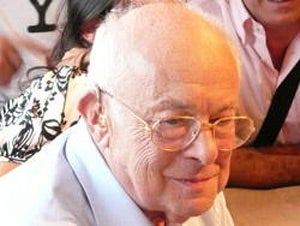Primo Levi's Auschwitz survivor 'Pikolo' dies

Your support helps us to tell the story
From reproductive rights to climate change to Big Tech, The Independent is on the ground when the story is developing. Whether it's investigating the financials of Elon Musk's pro-Trump PAC or producing our latest documentary, 'The A Word', which shines a light on the American women fighting for reproductive rights, we know how important it is to parse out the facts from the messaging.
At such a critical moment in US history, we need reporters on the ground. Your donation allows us to keep sending journalists to speak to both sides of the story.
The Independent is trusted by Americans across the entire political spectrum. And unlike many other quality news outlets, we choose not to lock Americans out of our reporting and analysis with paywalls. We believe quality journalism should be available to everyone, paid for by those who can afford it.
Your support makes all the difference.For decades Jean Samuel chose never to discuss his wartime experiences as an Auschwitz survivor. Living quietly as a local pharmacist, a post he inherited from his father in a small Alsace town, not even his own family could guess that he was Pikolo, the diminutive and quietly spoken beacon of humanity who inspired his friend and fellow concentration camp inmate Primo Levi to immortalise him in his definitive Holocaust memoir If This is a Man.
It was not until much later in life that the French Jew chose to break cover and bear witness to the horrors he had seen at Auschwitz in 1944 and on a death march to Buchenwald after a resurgence of anti-Semitism in his native country in the 1980s.
Yesterday it was confirmed that Mr Samuel had died aged 89 in Strasbourg. Jean-Marc Dreyfus, a lecturer in Holocaust studies at Manchester University who collaborated on a book of Pikolo's life, said he had never wanted to stand out from the group of Auschwitz survivors.
"He did not want to speak for his own sake, always saying that one should read Levi's book. But his story of survival and remembrance is – like the one of a Holocaust survivor – remarkable too. I will always remember his dedication to his task – to be a witness, one of the last – and his kindness," he said.
Samuel and Levi, both chemists, worked on a special project helping to produce rubber for the Nazi war effort. They had already survived the gassing of many of their fellow Jews and suffered the casual brutality of the camp regime which claimed the lives of 1.2 million.
In perhaps the most celebrated chapter in Levi's masterpiece, the two men are delivering soup together – giving them a rare opportunity away from the hell of their daily lives to talk.
Join our commenting forum
Join thought-provoking conversations, follow other Independent readers and see their replies
Comments